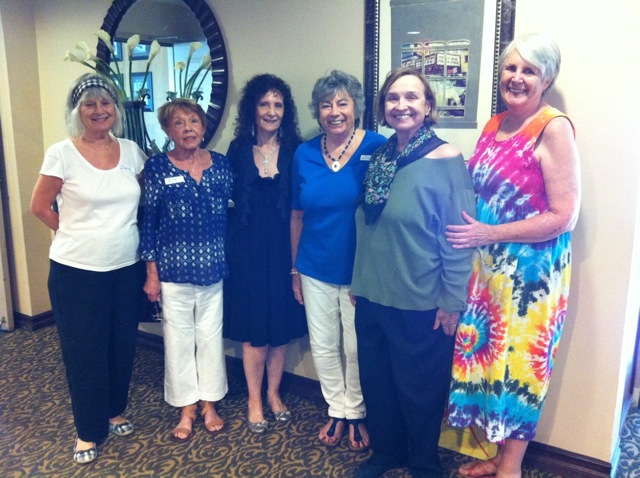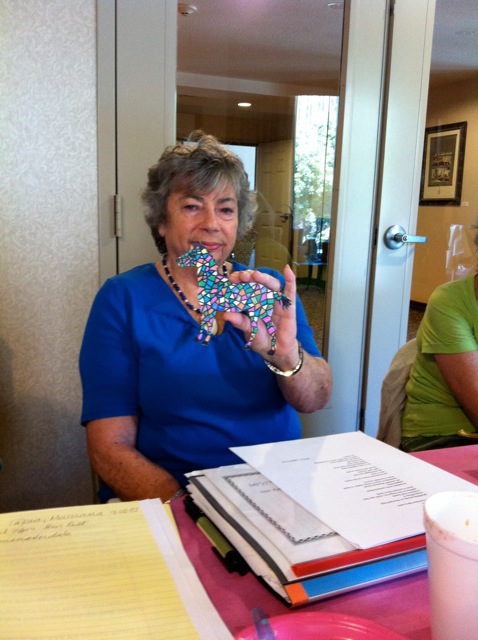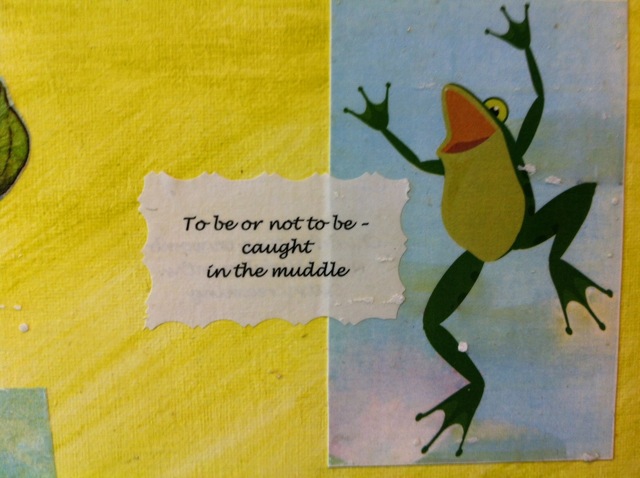Readings/Workshops (West) associate director Jamie FitzGerald reports on a visit to the P&W–supported EngAGE senior writing workshop, taught by Hannah R. Menkin. Menkin is an educator, poet, and visual artist, who uses an integrative approach to help adults, older adults, and veterans discover their own voice through oral history, memoir, storytelling, and the creative/expressive arts.
 “What is a poem?” asked Hannah Menkin, facilitator of the P&W–supported poetry workshop for residents of the Burbank Senior Artists Colony. The participants answered: “expressive,” “cathartic,” “a tiny soliloquy that comes from a deep well,” “a mirror of what you hold onto inside,” revealing in these answers their special relationship with the art form.
“What is a poem?” asked Hannah Menkin, facilitator of the P&W–supported poetry workshop for residents of the Burbank Senior Artists Colony. The participants answered: “expressive,” “cathartic,” “a tiny soliloquy that comes from a deep well,” “a mirror of what you hold onto inside,” revealing in these answers their special relationship with the art form.
Over the past five years, this Poetry Toolbox class of older adults has become close, defining itself as a women’s writing group. Participants regularly refer to each other as sisters, including new member Sharon Yofan, who commented: “I love poetry, but was absolutely blocked. I couldn’t write on demand. There’s magic in this space, and I’ve been writing ever since. I feel so connected to our sisters here. It’s food for body, mind, and spirit.”
Last fall, we reported on one of their Poetry & Tea events, which reaffirmed for us the transformative power of writing; this year’s event was no less inspiring. It was devoted to honoring women poets. Each participant spoke about what the workshop meant to her, read a favorite poem by a female poet, and then some of their own work.
 Dolly Brittan, who lived in South Africa for seventy-two years before moving to Burbank, described how the class has given her “permission to be.” She brought in a tribute poem to Nelson Mandela by a poet named cheryl irene and read her own poem about her pet tortoise, Honkytonk. Felicia Soissons-Segal read a persona poem in which the speaker was an umbrella. Abigail Howard’s poem “Jacaranda Oleander” left us chanting “jacaranda oleander, jacaranda oleander.” Another member of the group, Ayn Phillips, read a poem titled “Finding Poetry” that began with the words “Dam bursts…,” a phenomenon that appears to happen regularly in this class.
Dolly Brittan, who lived in South Africa for seventy-two years before moving to Burbank, described how the class has given her “permission to be.” She brought in a tribute poem to Nelson Mandela by a poet named cheryl irene and read her own poem about her pet tortoise, Honkytonk. Felicia Soissons-Segal read a persona poem in which the speaker was an umbrella. Abigail Howard’s poem “Jacaranda Oleander” left us chanting “jacaranda oleander, jacaranda oleander.” Another member of the group, Ayn Phillips, read a poem titled “Finding Poetry” that began with the words “Dam bursts…,” a phenomenon that appears to happen regularly in this class.
Also celebrated were Lucille Clifton, Linda Hogan, Emily Dickinson’s poem number 465, and Anne Sexton’s “The Bells.” At each turn, we discussed our interpretations of the poems.
The conversation turned to perceptions of older adults. After the passing of her husband of fifty-two years, Brittan is in a new relationship—“and at my age!” she exclaimed. Kit Harper was also trying bold new things, in the literary realm.
About submitting her poetry to literary magazines, Harper said: “Doing is a lot more fun than thinking about it. It’s a lot more invigorating.”
There seemed to be consensus with Menkin’s opinion that “The image of older people needs to change. Positive stereotypes are needed, not negative ones. I don’t like the word ‘seniors.’ I like the words ‘elders,’ ‘older adults,’ ‘wisdom people.’”
Maureen Kellen-Taylor, chief operating officer of the workshop’s sponsoring organization EngAGE, told a story about an older artist who said that “when she’s acting or writing or painting, she feels ageless.”
 But the perils of age do surface at times. Due to a fall, workshop member Karolyn Merson was hospitalized and unable to attend the day’s event (but is now back and writing with the group). Now in her nineties, Merson is beloved for her wit and admired for publishing a book of her haiku. The class has coined the term “Karolysms” in her honor. Merson had wanted to read “A Summer Day” by Mary Oliver. In her stead, Menkin read the poem, which ends with the lines:
But the perils of age do surface at times. Due to a fall, workshop member Karolyn Merson was hospitalized and unable to attend the day’s event (but is now back and writing with the group). Now in her nineties, Merson is beloved for her wit and admired for publishing a book of her haiku. The class has coined the term “Karolysms” in her honor. Merson had wanted to read “A Summer Day” by Mary Oliver. In her stead, Menkin read the poem, which ends with the lines:
Tell me, what is it you plan to do
with your one wild and precious life?
These wisdom people know.
Photo 1: Members of the Poetry Toolbox workshop (from left to right): Sharon Yofan, Kit Harper, facilitator Hannah Menkin, Dolly Brittan, Felicia Soissons-Segal, and Abigail Howard. Photo 2: Dolly Brittan with a paper horse used in a writing exercise. Photo 3: A haiku-like poem/Karolysm by Karolyn Merson. Credit: Jamie FitzGerald.
Major support for Readings/Workshops in California is provided by The James Irvine Foundation. Additional support comes from the Friends of Poets & Writers.






